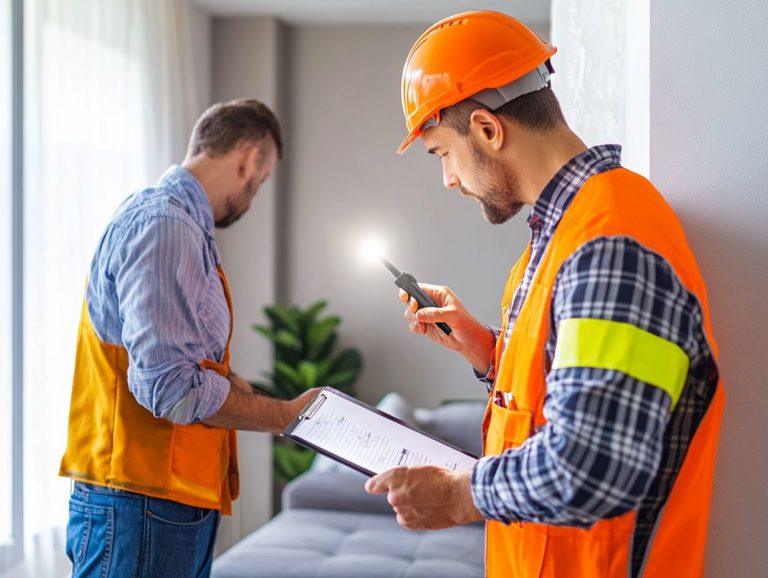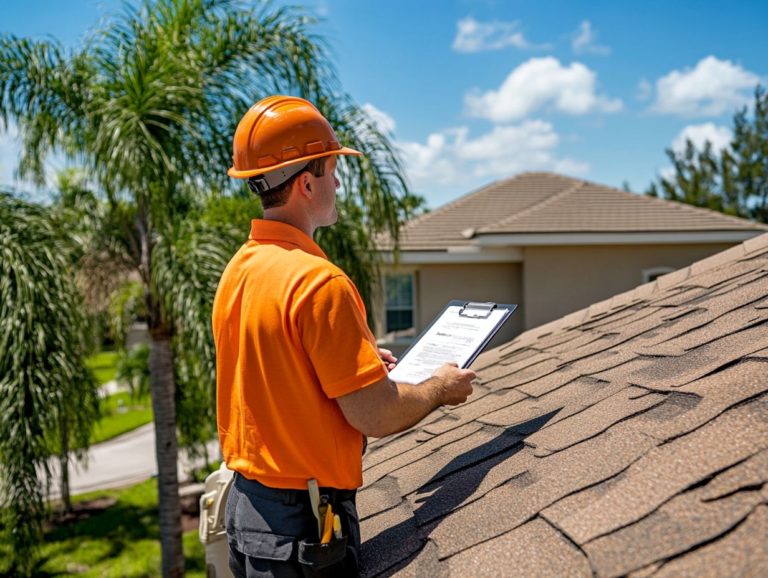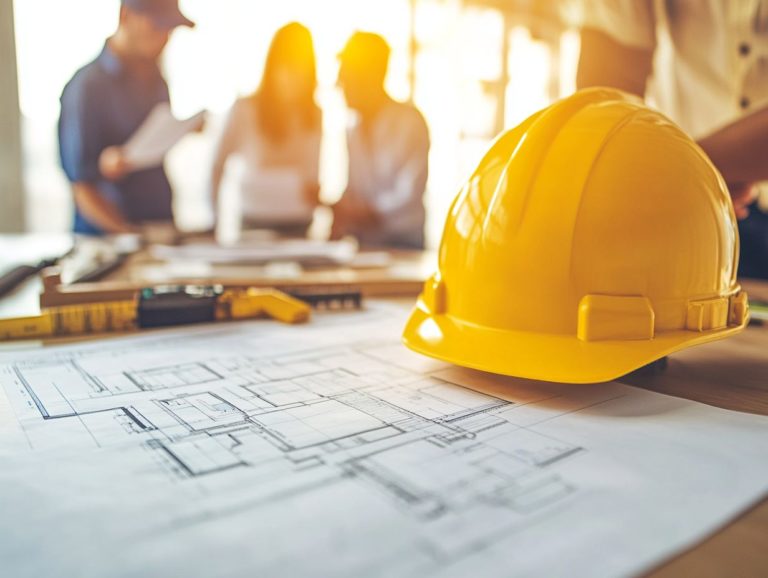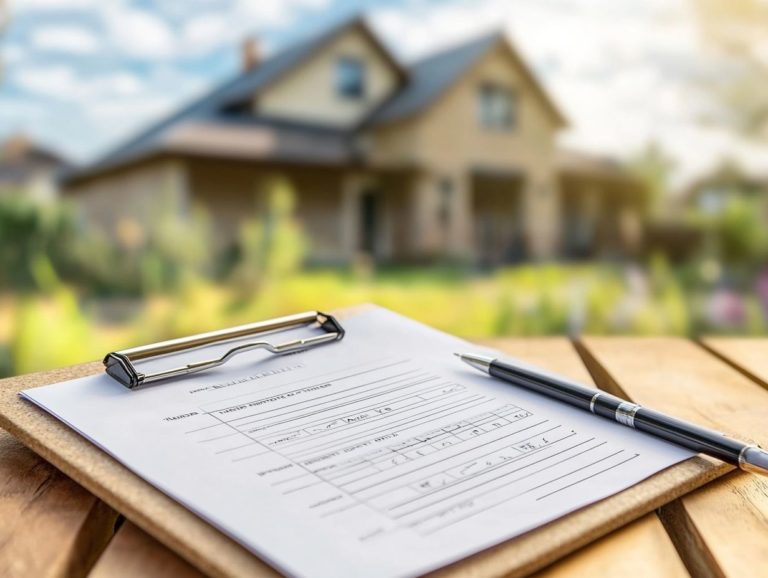The Importance of Home Inspections for Buyers
Buying a home is one of the most significant investments you’ll ever undertake. It is essential to ensure that this investment is a sound one.
A home inspection is a crucial part of this journey. It provides you with a thorough understanding of the property’s condition.
By identifying potential issues and aiding in negotiations for repairs, understanding home inspections can empower you as a buyer.
This article will guide you through everything you need to know about the home inspection process, its importance, and how to maximize your investment.
Contents
- Key Takeaways:
- What is a Home Inspection?
- Why Home Inspections are Important for Buyers
- What a Home Inspection Covers
- Conclusion
- How to Find a Reliable Home Inspector
- Costs and Considerations for Home Inspections
- What to Do with the Inspection Report
- Negotiating Based on Inspection Findings
- Common Home Inspection Mistakes
- Frequently Asked Questions
Key Takeaways:

Home inspections provide buyers with an in-depth understanding of a property’s condition. This knowledge helps them make informed decisions and avoid potential costly surprises in the future.
A thorough home inspection covers various areas and systems of a property, including its structure, plumbing, electrical, and heating, ventilation, and air conditioning (HVAC) systems. This provides buyers with a comprehensive overview of the property’s overall condition.
Choosing a reliable and qualified home inspector is crucial for a thorough and accurate inspection. Buyers should carefully consider factors such as experience, qualifications, and references when making their decision.
What is a Home Inspection?
A home inspection is a careful evaluation of a property performed by a qualified professional. Its purpose is to uncover potential problems, assess safety risks, and provide crucial insights into the overall condition of the home.
This careful process is essential for both buyers and sellers in real estate transactions. Understanding the importance of home inspections can reveal significant issues concerning structural integrity, electrical systems, plumbing, and other vital components of the property.
By understanding the inspection report, you can make informed decisions, negotiate favorable terms, and ultimately safeguard your investment.
Why Home Inspections are Important for Buyers
Home inspections are vital for you as a buyer. They help alleviate buyer’s remorse by revealing potential safety risks and structural concerns before you commit to a purchase. Understanding the importance of a home inspection for buyers can provide peace of mind in your home-buying journey.
A comprehensive inspection gives you valuable insights, enabling you to negotiate better terms in your real estate transaction and ensuring that your investment is sound.
Don t risk unexpected repair costs get a home inspection! Skipping a proper home inspection can lead to costly repairs and safety hazards, jeopardizing your financial stability and peace of mind as a homeowner.
What a Home Inspection Covers
A home inspection includes a thorough examination of various areas and systems within a property. This evaluation covers structural elements, HVAC systems, electrical components, and plumbing.
This in-depth analysis ensures you understand the property s overall condition. Inspectors can pinpoint critical issues such as foundational problems, mold, and other safety risks that might escape the notice of an untrained eye.
Areas and Systems Assessed
During a home inspection, focus on critical areas and systems that are assessed, including structural integrity, HVAC systems, electrical concerns, and plumbing. This comprehensive evaluation provides a clear picture of the property s overall condition.
Each of these components is crucial for ensuring your home is safe and livable. For instance, structural integrity is essential for supporting the entire building s weight and avoiding those expensive repairs that arise from foundation issues.
HVAC systems are not just about comfort; they also ensure proper ventilation, which is key for your health and energy efficiency.
Electrical systems undergo thorough scrutiny to identify potential hazards since faulty wiring can present serious fire risks. Plumbing inspections reveal any leaks or pipe damage that could lead to water damage or even mold growth.
This underscores the necessity for a meticulous review of all these systems to safeguard your investment and peace of mind.
Conclusion
In summary, home inspections are essential for any prospective buyer. They help you avoid costly surprises and ensure that your new home is safe and sound. Don’t overlook the importance of home inspections for buyers in your home-buying journey!
How to Find a Reliable Home Inspector

Finding a reliable home inspector is crucial for getting a thorough evaluation of your property.
Focus on qualified professionals who belong to reputable organizations, such as the American Society of Home Inspectors or the International Association of Certified Home Inspectors. Check the Better Business Bureau for reviews and ratings to help you find a trustworthy inspector.
Taking these steps can boost your confidence and help you avoid making a costly mistake! This diligent process ensures that critical issues are identified and addressed, giving you peace of mind in your investment.
Tips for Choosing a Qualified Professional
When selecting a qualified home inspector, consider licensing, experience, and customer reviews. These factors ensure you’re hiring a capable professional.
It’s wise to check if the inspector is affiliated with reputable associations, as this often indicates a commitment to industry standards and ongoing education.
Request references from past clients to gauge the inspector’s reliability and thoroughness.
Reading online reviews can provide valuable insights into other homeowners’ experiences, showcasing both strengths and weaknesses.
Ultimately, making an informed choice is essential; the right inspector can uncover potential issues, offering you peace of mind and protecting your investment during the home buying process, especially when considering the role of home inspections for first-time buyers.
Costs and Considerations for Home Inspections
The costs and considerations for home inspections can vary based on several factors, including the size and condition of the property and the inspection process.
Understanding these elements can help you budget for maintenance expenses and make informed choices about your potential investment.
Moreover, knowing what affects the price of a home inspection will enable you to select the right inspector tailored to your specific needs.
Factors that Affect the Price
Several factors influence the price of a home inspection, including the property’s condition, size, age, and the thoroughness of the inspection.
A larger home typically requires more time and effort for a comprehensive inspection, which can increase costs. Similarly, older properties often have unique systems that require a more detailed evaluation, potentially raising the fee.
The inspector’s experience and qualifications also matter; seasoned professionals may charge more due to their expertise and ability to spot subtle issues that less experienced inspectors might miss.
Understanding these variables is essential for homebuyers and sellers. By grasping these nuances, you can navigate the real estate landscape confidently, making informed decisions that greatly influence your financial outcomes.
What to Do with the Inspection Report
Once you receive the inspection report, you need to understand how to interpret the findings and take action based on the results.
This report offers invaluable insights into the property’s condition, pinpointing safety risks and potential issues that can serve as negotiation leverage during your real estate transaction.
Understanding how to utilize this information quickly is crucial to making informed decisions in your home buying journey! It can significantly influence your experience and enhance your long-term satisfaction.
Interpreting and Acting on the Results

Interpreting the findings in the inspection report requires a keen understanding of the implications behind each identified issue. This understanding allows you to determine the necessary action steps to address them.
This process is crucial for any prospective buyer, as it not only reveals the current state of the property but also lays the groundwork for potential negotiations with the seller.
For instance, if the inspection uncovers a leaky roof, your interpretation should involve evaluating the cost and complexity of the repairs. This insight may prompt you to request a price reduction or insist on repairs before closing.
Such understanding not only guides your next steps but also enables you during negotiations. By approaching discussions armed with clear evidence and actionable recommendations from the inspection findings, you can foster a more constructive dialogue. This ensures that your investment is safeguarded and aligns with your expectations.
Negotiating Based on Inspection Findings
Negotiating based on inspection findings is an essential step in your home buying journey. This is your chance to leverage the insights from the inspection report, enabling you to request necessary repairs or credits from the seller.
By doing so, you can significantly influence the overall cost of homeownership and enhance your satisfaction with the purchase. Addressing potential issues before finalizing the transaction is crucial.
An effective negotiation strategy can turn inspection findings into valuable opportunities. Act now to secure the best deal and ensure you make the most informed decisions possible.
Strategies for Requesting Repairs or Credits
In terms of requesting repairs or credits based on inspection findings, employing effective negotiation strategies can greatly affect the outcome of your transaction.
To refine your approach, begin by meticulously reviewing the inspection report and pinpointing specific issues that warrant attention. This establishes a solid factual foundation for your request and allows you to communicate clearly with the seller about necessary repairs or reasonable credits.
Understanding the seller s motivations can lead to a more fruitful dialogue. By framing the conversation around mutual interests and viable solutions such as proposing a swift closing in exchange for concessions you enhance your chances of receiving a favorable response from sellers eager to preserve goodwill.
Common Home Inspection Mistakes
Understanding common home inspection mistakes can greatly elevate your awareness as a buyer. This knowledge guides you toward more informed decisions during the property evaluation process.
It’s easy to overlook critical elements or place excessive trust in the inspector’s findings without performing your own careful effort to gather all necessary information about the property. Such oversights can result in unexpected challenges later on, highlighting the necessity of being proactive and engaged throughout the inspection journey.
How to Avoid These Mistakes
To steer clear of common home inspection blunders, take a proactive stance and engage in thorough due diligence throughout the entire process.
This means asking insightful questions about the property’s history, recognizing potential red flags, and making it a point to attend the inspection yourself. Being there during the inspection gives you valuable firsthand insights from the inspector and allows you to address any concerns right then and there.
It’s wise to seek additional opinions, especially for significant issues like structural integrity or pest infestations, as this offers a well-rounded perspective.
By collaborating with knowledgeable professionals, you not only equip yourself with essential information but also ensure you are well-informed and ready to tackle any challenges that may arise.
Frequently Asked Questions

What is the importance of home inspections for buyers?
Home inspections are crucial for buyers as they provide a detailed assessment of the condition of the property. Understanding the importance of home inspections for property buyers helps buyers make informed decisions about their investment and avoid potential future issues, such as hidden problems like mold or plumbing issues that could cost thousands to fix.
How do home inspections benefit buyers?
Home inspections help buyers identify safety or structural issues before purchasing. Understanding the importance of home inspections in real estate can assist buyers in negotiating repairs or lowering the sale price, saving them from unexpected costs later.
Who should hire a home inspector?
Every buyer should hire a professional home inspector. These experts have the tools and experience to spot potential problems in a property, highlighting the importance of home inspections for real estate transactions.
When should buyers schedule a home inspection?
Schedule a home inspection as soon as your offer is accepted. This gives you a clear picture of the property’s condition and helps you negotiate repairs or price adjustments.
What should buyers look for in a home inspection report?
A good report includes detailed information about the property’s condition. Look for potential issues, recommended repairs, photographs, and notes to understand better.
What happens if the home inspection reveals major issues?
If there are significant issues, buyers can ask the seller to lower the price or make necessary repairs. If the seller won t budge, buyers can walk away from the deal without penalties.






